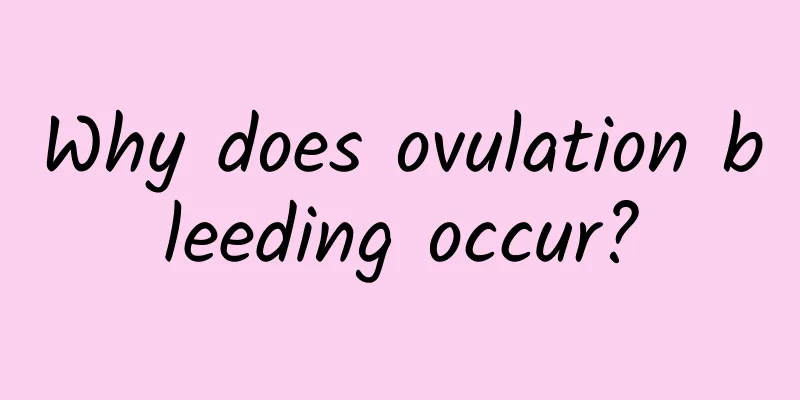Why does ovulation bleeding occur?

|
Why does ovulation bleeding occur? Many couples who are actively trying to have a baby will make good use of the ovulation period, but ovulation bleeding makes them very worried. They worry about what is wrong with their bodies, the quality of the fertilized egg, and the normal development of the fetus. So, why does ovulation bleeding occur? Many female friends may experience ovulation bleeding. Generally, the amount of bleeding is very small, and many people don't even notice it at all. However, some people will have obvious bleeding symptoms, and the severity cannot be generalized. Ovulation bleeding has both physiological reasons and reproductive system diseases, such as irregular menstruation, cervical polyps, cervical erosion, cervical cancer, endometrial adenocarcinoma, uterine submucosal fibroids, endometrial polyps, etc. Experts say that patients with physiological ovulation bleeding do not need to worry too much, they just need to pay attention to it in their daily lives, such as paying attention to menstrual hygiene, eating less spicy food, and not overworking. Usually, before ovulation, the estrogen level of women reaches its peak. When ovulation occurs, the mature follicle ruptures, the egg is released, and the estrogen level drops rapidly, causing the endometrium, which is nourished by estrogen and undergoes a hyperplastic reaction, to lose support and cause a little bleeding. Under normal circumstances, this bleeding is extremely short (about 1 to 2 hours), and only red blood cells can be seen in the leucorrhea under a microscope. The duration of visible vaginal bleeding can be a few hours, or 3 to 5 days, but rarely more than 7 days. In severe cases, it can also be continuous until the next menstrual period. Generally speaking, ovulation bleeding will last for 2-3 days, which is something that every woman may experience, so don't worry. If it is clean within 2-3 days, there is no problem, but if the leucorrhea is accompanied by blood for more than 7 days, and the amount of bleeding is large, then it needs to be taken seriously and timely treatment is required if necessary. |
<<: What are the characteristics of intrauterine adhesions?
>>: What are the harmful manifestations of intrauterine adhesions?
Recommend
What are the treatments for cervicitis?
With the quickening pace of life and the increasi...
Does ectopic pregnancy require fallopian tube removal?
If there are no abnormal vital signs in an ectopi...
How to treat abortion syndrome? Introduction to the treatment methods of abortion syndrome
Speaking of abortion, many female friends think i...
What are the treatments for vaginitis?
What are the treatments for vaginitis? This is a ...
Treatment of gynecological adnexitis in the elderly
Adnexitis requires appropriate treatment based on...
Common causes of vulvar leukoplakia
What are the main causes of common vulvar leukopl...
My period has stopped for a few months, what's going on?
If your period comes back after a few months of a...
Water jet liposuction reduces swelling and allows you to lose weight during lunch break
Water jet liposuction can also help you lose weig...
What are the symptoms of habitual miscarriage and how to protect the fetus?
The main symptoms of habitual miscarriage are a s...
What to do if adenomyosis is mild
What should I do if adenomyosis is mild? 1. Uteri...
Does eating fruit at night provide iron? Traditional Chinese Medicine: Excessive moisture leads to obesity! Ginger powder acupoint application for dehumidification
"In order to maintain health, don't eat ...
Improve metabolism and burn fat ~ These 3 fruits with yogurt will help you lose weight quickly
To lose weight, you don’t have to go on a diet or...
How to treat cervical warts
Cervical warts are a serious skin disease. How to...
Hospital check abortion recovery
After an abortion, women need to know whether the...
Patients with cervical erosion should know some daily precautions
Nowadays, people of all ages may suffer from cerv...









